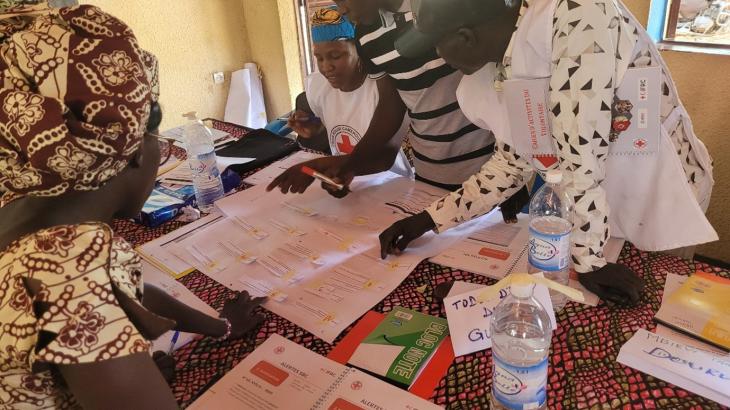Dates of implementation: 2019 - present
Implementation areas:
- Far North region : Logone et chari, Mayo Sava, Diamaré, Mayo Kani and Mayo danay division
- North Region : Benoué, Mayo Rey and Mayo Louti division
- Littoral region, Wouri and Moungo division
- Centre region : Mbam et Inoubou and Mefou et Afamba division,
- South region : Dja et Lobo and Valée du Ntem division
- South West region: Fako division
Diseases/health events monitored:
- Human diseases : acute watery diarrhea, measles, mpox, acute flaccid paralysis, yellow fever, meningitis, viral hemorrhagic fevers, Covid-19, death or unusual illness in humans
- Animal diseases: rabies, anthrax, Rift Valley Fever, unusual death or illness of animals
Context: Preparedness and response during outbreaks
Project/programme/emergency responses that CBS is or has been used for:
- Community Epidemic and Pandemic Preparedness Programme (CP3)
- ECHO Programmatic Partnership
- Mpox emergency appeal
- Cameroon Red Cross' cholera early action protocol (EAP)
Data collection system: Started with paper reporting system and transitioned to Nyss in 2023
Partners: IFRC, CRF French Red Cross, Ministry of Public Health (MoH) and the Ministry of Livestock, Fisheries and Animal Industry.
Donors: USAID, ECHO, Internal funds
The Cameroon Red Cross began implementing the CBS through the Community Epidemic and Pandemic Preparedness Programme (CP3), and started using the Nyss platform in 2023. Through this USAID-funded program, 377 volunteers were trained in the North region, covering 14 out of 15 health districts.
In 2024, the ECHO programmatic partnership initiative, implemented in 4 health districts in the Far North region, trained 169 volunteers in community-based surveillance, while the mpox emergency appeal trained 109 active volunteers in 10 health districts in the Centre, South, Coastal and South-West regions.
In 2025, the Cameroon Red Cross developed a Cholera Early Action Protocol and as part of these activities, 62 volunteers were trained in CBS.
As of 2025, the National Society has 717 volunteers trained and deployed for early detection of disease in the community. These volunteers work closely with the Ministry of Health and Animal Husbandry to facilitate and rapid notification of diseases.
Related stories and case studies:

